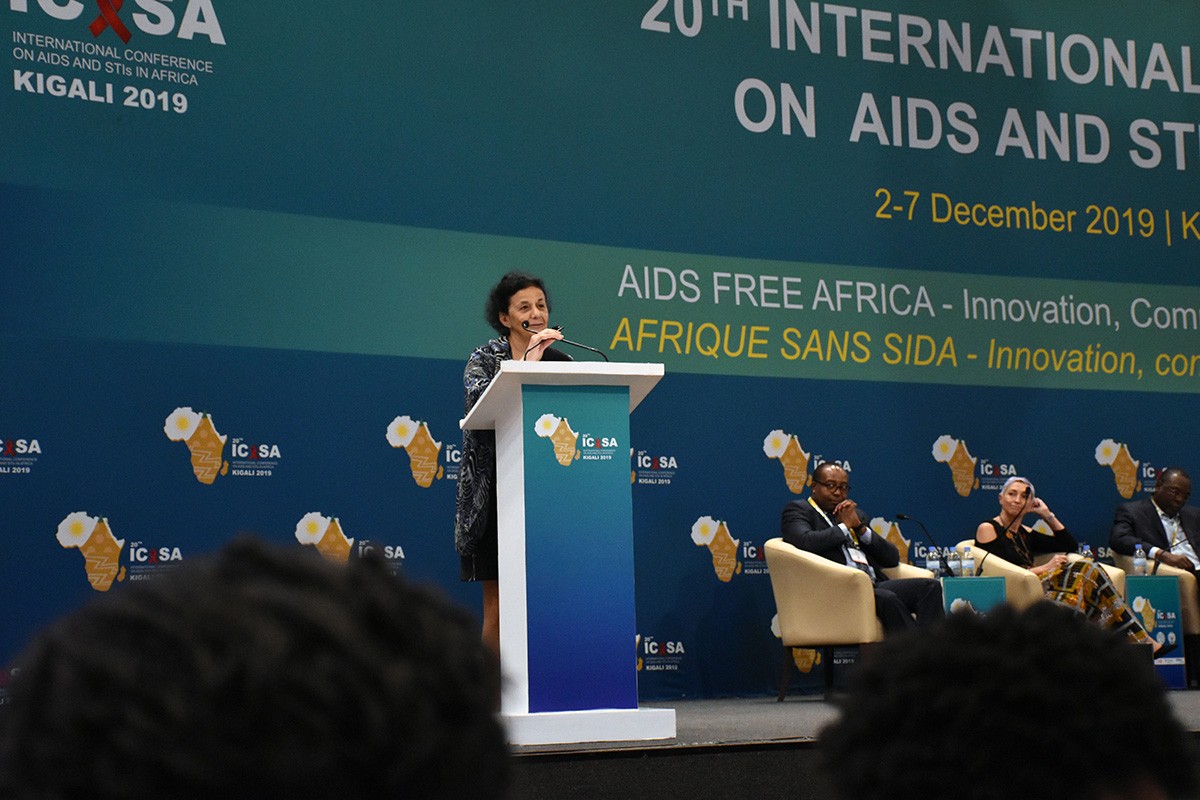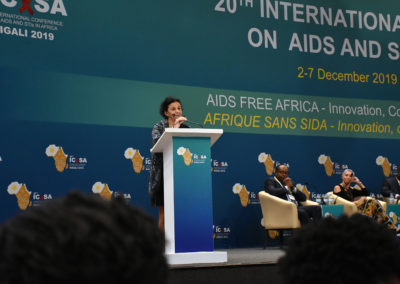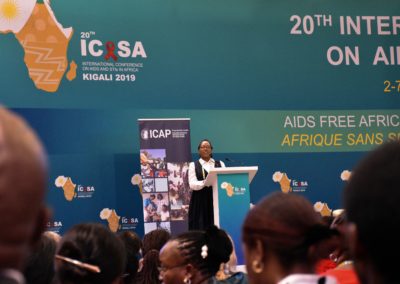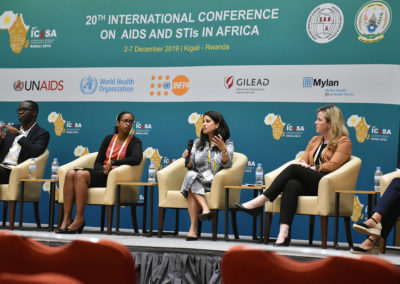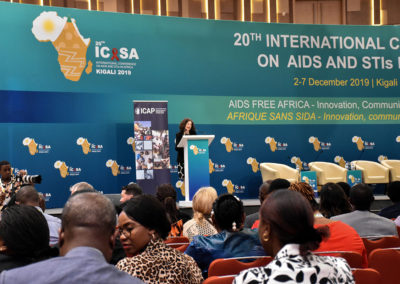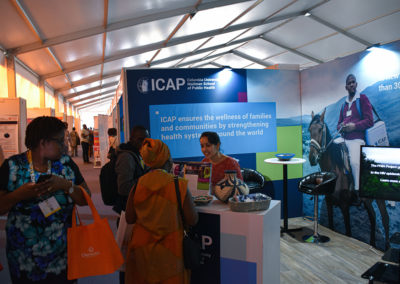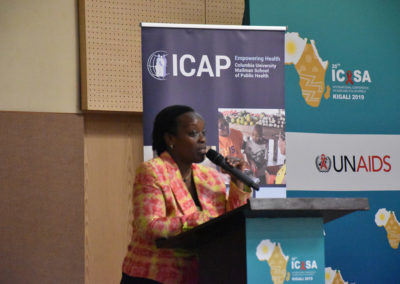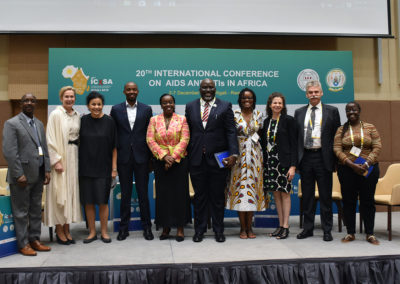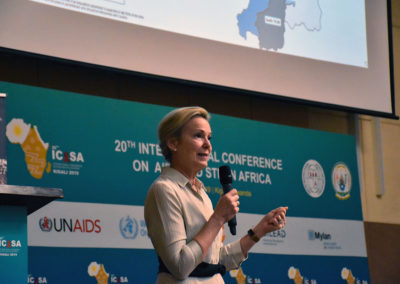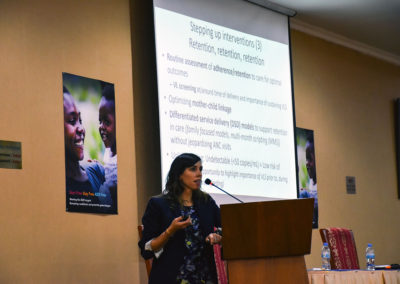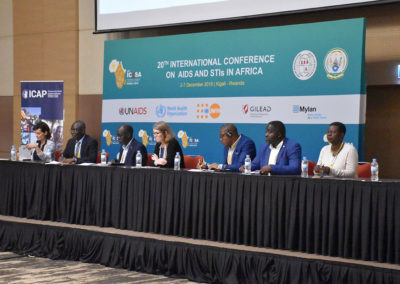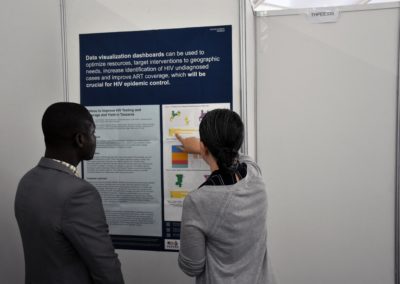At the 20th International Conference on AIDS and STIs in Africa (ICASA), the central theme focused on achieving an AIDS Free Africa through innovation, community and political leadership. Held in Kigali from December 2-7, nearly 10,000 delegates from across the world attended the conference for an opportunity to learn about the latest research, clinical advancements, and policies moving forward global efforts towards HIV epidemic control—particularly in Africa.
Throughout the week, ICAP organized and participated in several satellite sessions and led or co-authored more than 25 scientific posters. At a plenary session, ICAP’s Founder and Global Director, Wafaa El-Sadr, MD, MPH, MPA, presented on integrating HIV care with emerging infections, comorbidities, and non-communicable diseases (NCDs).
“We must focus on the health needs of the people we serve,” noted Wafaa El-Sadr “This compels us to seek the most effective ways to deliver the services they need—in an integrated manner and at the highest quality. It is time to move from small pilot programs to the scale-up of NCD/HIV integration in order to confront these two epidemics.”
ICAP also organized three satellite sessions to showcase its work on general and key population surveys; HIV drug resistance survey implementation; and differentiated service delivery and advanced HIV disease.
The session on general and key population surveys highlighted the unique differences between general and key population surveys but also emphasized their synergies as they both provide critical data on the current HIV epidemic and can suggest how to better prioritize HIV prevention, treatment and delivery services.
“How do we know the effectiveness of HIV interventions? How do we know if medication given to people with HIV are being well-taken?” asked Hon. Diane Gashumba, MD, MMed, Minister of Health, Rwanda, “This is where population surveys come in and why they are important. Population-based surveys provide information that can be generalized so we know which categories of people we need more focus on and whether we need to adjust our policies.”
“PHIA data, bio behavioral survey data and program data are essential for understanding where we are in addressing the epidemic,” says Ambassador-at-Large Deborah L. Birx, MD, U.S. Global AIDS Coordinator, “but it can’t be analyzed in a vacuum. Data must be triangulated from multiple sources to build a fuller picture of the epidemic.”
Esteemed panelists during this session also discussed the importance of how general and key population surveys influence community-led HIV programs, future HIV program planning, and defining the UNAIDS 90-90-90 targets.
Another satellite session organized by ICAP and Rwanda Biomedical Center shared learnings from HIV drug resistance (HIVDR) survey implementations, focusing on country-level experiences and evidence for policy decisions.
Chaired by ICAP’s Senior Technical Director, Jessica Justman, MD, speakers shared lessons learned from carrying out standardized and nationally representative HIVDR surveys, as recommended by the World Health Organization (WHO), in Eswatini, Rwanda, Lesotho and Switzerland along with the latest policy recommendations for surveillance, programmatic responses, and treatment guidelines to address and control rising levels of drug-resistant HIV.
ICAP’s HIV Coverage, Quality and Impact Network (CQUIN) brings countries together to share innovations in differentiated service delivery (DSD) and work towards sustainable, high quality HIV programs. At ICASA, the CQUIN network convened DSD implementers from ministries of health, organizations of people living with HIV, implementing partners, and donors. Their participation in an interactive satellite session called attention to the importance of DSD for advanced HIV disease. Their experiences also focused on the importance of sharing innovations and global best practices for DSD.
“Differentiated service delivery is key in addressing the individual needs of people and communities. There is a need to take a public health approach to ending HIV in order to reach everyone” said Peter Preko, MBChB, MPH, CQUIN Project Director, “Not only is it important to increase coverage but it is equally important to ensure the quality of services.”
ICAP staff participated in several other meetings during ICASA. Fatima Tsiouris, MS, ICAP’s Deputy Director of Training, who provided an update on the latest progress in closing key gaps in mother-to-child-transmission of HIV at The Joint United Nations Programme on HIV/AIDS (UNAIDS) meeting on ‘START FREE, STAY FREE, AIDS FREE: Meeting the 2020 HIV Targets for Children, Adolescents and Young Women: remaining roadblocks and potential game-changers.’
At a session led by United States Agency for International Development (USAID), ICAP’s Nandita Sugandhi, MD, discussed challenges that clinical implementing partners face in shifting to new and improved HIV treatment regimens as well as what opportunities exist to engage with local and global implementers to support the transition to TLD, a new line of antiretroviral treatment.
At the ICASA exhibition space, conference attendees learned about ICAP’s latest work and global presence at its exciting exhibition booth. Elsewhere in the exhibition hall, ICAP team members and partner organizations disseminated research findings and programmatic results during poster presentations throughout the week.
The full overview of ICAP’s participation at the ICASA 2019 conference can be found online here. The ICASA 2019 website also includes some links to video recordings and may be updated in the coming weeks with additional resources, such as slides and abstract excerpts.
To view more scenes from ICAP at ICASA 2019, visit ICAP’s photo gallery here.
To explore the latest ICAP research, click “Publications” on the Tools & Resources section of ICAP’s website.


